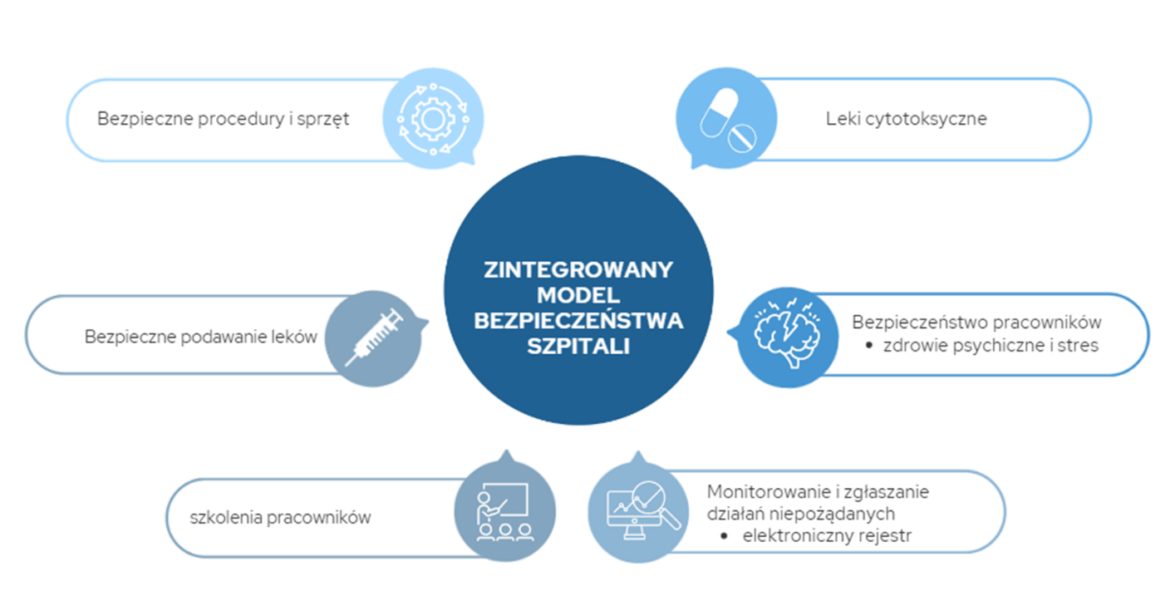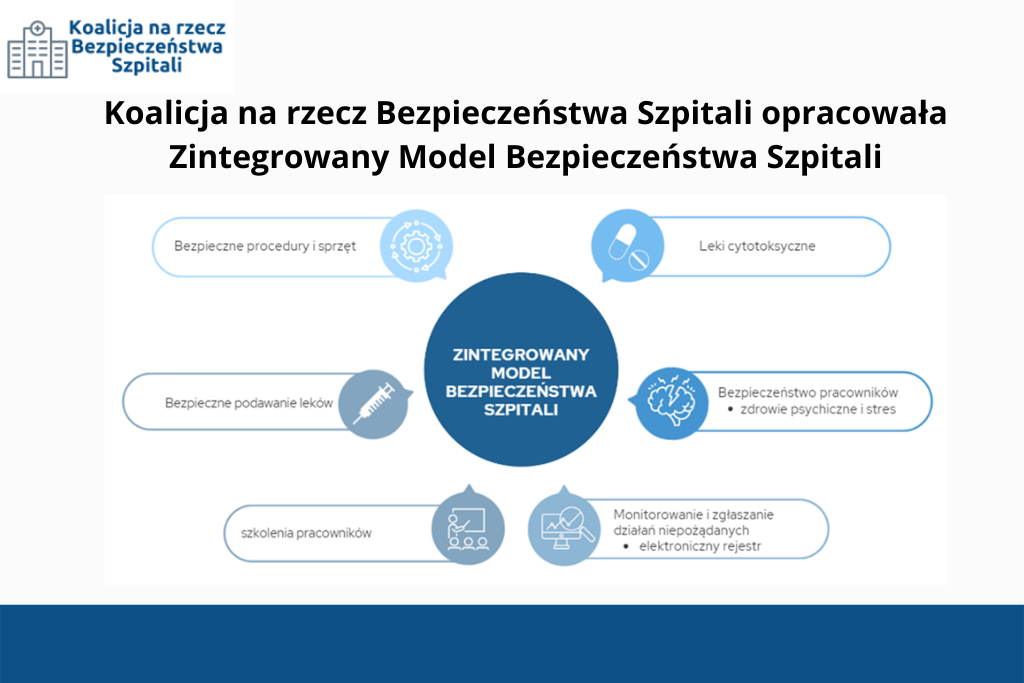The data from the "Safe Hospital is Safe Patient" report on the level of safety in Polish hospitals are alarming. Safe equipment in hospitals accounts for less than 50% of all equipment owned, only 27% facilities in Poland use an electronic register of adverse events, and almost 30% hospitals do not use closed systems to protect medical staff from harmful substances when preparing cytotoxic drugs[1]. The Coalition for Hospital Safety, has developed an Integrated Hospital Safety Model, which is essential for improving safety in medical facilities, and the criteria in it should be included in quality indicators in healthcare.
Integrated Safety Model for Hospitals - criteria to be implemented, in medical facilities
Given the above data, it was necessary to develop a solution that could be implemented in Polish medical facilities. The Board of Experts of the Coalition for Hospital Safety developed an Integrated Model for Hospital Safety, where six key criteria were taken into account:
- safe procedures and equipment
- cytotoxic drugs
- safe administration of medicines
- employee training
- monitoring and reporting of adverse reactions
- safety of medical staff
The Integrated Safety Model for Hospitals should be implemented at every level of the facilities, starting with the system solutions at central level, up to the teams and medical staff working in the hospitals.
"There has been a lack of a comprehensive solution in the Polish health care system, which would be an answer to the problems in hospitals, especially those related to safety. Proper implementation of the Integrated Model of Hospitals and the above criteria will be invaluable in increasing the level of safety in medical facilities. It would also be worthwhile to reward hospitals that adhere to these guidelines, which will motivate other facilities to improve the quality of their services." - comments Dr. med. and n. o zdr. Paweł Witt Chairman of the Expert Council of the Hospital Safety Coalition.
[1] Report "A Safe Hospital is a Safe Patient

Particularly important in the context of the Integrated Hospital Safety Model, are injuries and stabbings among medical staff and the consequences they can have, including infections, absenteeism from work and stress. Coalition experts point out that occupational escalation can be reduced through the use of safe equipment, training of medical staff and through the introduction of an electronic adverse event register.
"Nursing and midwifery staff are a group particularly vulnerable to occupational escalation, which is why in the Integrated Hospital Safety Model, we have dedicated a large section to this topic. Understanding the challenges and risks that nurses and midwives face every day is key to creating a safe working environment. We aim to create a system where every healthcare worker feels safe and valued, which in turn translates into higher quality patient care." - adds Mariola Łodzinska, M.D., President of the Supreme Council of Nurses and Midwives and Expert of the Hospital Safety Coalition.
Quality indicators in health care, another step towards safety and quality in the health care system
The Health Care Quality and Patient Safety Act of 16 June 2023 stipulates that quality in health care is measured using indicators that fall within the clinical, consumer and management areas. A Team for the development of recommendations on healthcare quality indicators has recently completed its work and a report on this work is to be presented to the Minister of Health. From the point of view of the Experts of the Coalition for Hospital Safety, quality indicators in healthcare are essential for improving safety and quality in Polish medical institutions.
"Quality indicators in healthcare are essential for the efficiency of the health system. They will enable monitoring and the possibility of comparing services provided in health facilities, so that the quality of services provided and the management processes of health facilities can be improved." - comments Monika Pintal-Slimak President of the National Council of Laboratory Diagnosticians, Expert of the Hospital Safety Coalition.
In order for the level of safety in hospitals to be adequate, both for medical staff and patients, it is essential to implement criteria that avoid adverse events. The Board of Experts of the Hospital Safety Coalition calls for the inclusion in the quality indicators of the criteria, presented in the Integrated Hospital Safety Model. The indicators will allow quality to be monitored, assessed and compared, with a particular focus on safety in medical facilities.
"Recording of punctures and lacerations, gastrointestinal infections, use of safe equipment are some aspects that should give a measure of the level of quality in hospitals. The procedures currently in place to eliminate sharps in a procedure and the maintenance of a catalogue of safe equipment should be verified. Medical facilities should be assessed in the area of safety and the best ones rewarded accordingly." - adds dr n. med. o zdr. Paweł Witt Chairman of the Expert Council of the Hospital Safety Coalition.
The Hospital Safety Coalition was established in 2021 with the main aim of increasing the safety of healthcare workers in the workplace by, among other things, promoting and encouraging hospitals to use safe medical equipment. The Coalition's main project is the 'Safe Hospital is Safe Patient' programme, which is joined by medical facilities that adhere to its recommendations. Patronage of the project is held by: The National Health Fund, the Patient Ombudsman, the Supreme Chamber of Nurses and Midwives, the Polish Federation of Hospitals, the Supreme Medical Chamber, the Polish Association of Epidemiological Nurses, the Polish Society of Anaesthesia and Intensive Care Nurses, the Polish Society of Epidemiologists and Doctors of Infectious Diseases, the Polish Vascular Access Club, the Association of Hygiene in Healthcare, Polish Association of Private Hospitals, the Polish Pharmaceutical Society, the Supreme Pharmaceutical Chamber, the European Association of Clean Treatment, the Association of Healthy Polish Cities, the National Chamber of Laboratory Diagnosticians, the Polish Society of Microbiologists, the Polish Nursing Association, the National Trade Union of Physicians, the Institute for Patient Rights and Health Education and the Polish Society of Infusion Nursing.

